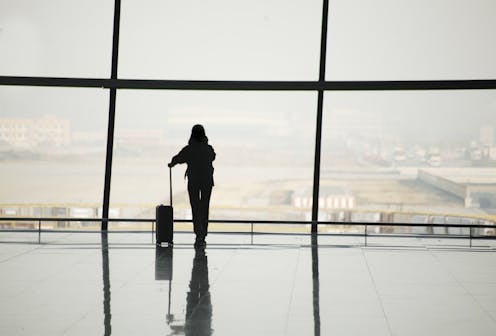Female business travelers pay less than their male colleagues because they tend to book earlier
- Written by Javier D. Donna, Assistant Professor of Economics, University of Florida

The Research Brief[1] is a short take about interesting academic work.
The big idea
Female employees consistently pay lower airfares than men do for the same flights because they tend to book earlier, according to a new peer-reviewed article[2] I co-authored.
To reach these conclusions, fellow economist Gregory F. Veramendi[3] and I analyzed[4] 7.4 million business trips taken in 2014 by about 2 million workers from 8,000 companies in 60 countries. The dataset included dozens of details such as price paid, origin, destination and how many days in advance of the trip the ticket was purchased, as well as demographics on the purchaser, such as employer, job, age and gender.
We compared the airfare paid by employees in the same position within a company for the same class of travel. For example, if a male manager at a specific company booked a business class flight from New York’s JFK airport to Los Angeles International Airport, we compared the price he paid with the one paid by a female manager at the same company for the same trip.
We used a common statistical technique known as multiple regression analysis with fixed effects[5] to account for other factors that might affect differences in airfares, such as the influence of frequent flyers and holiday bookings. We included over 40,000 of these variables.
We found that women paid on average US$18 less per ticket than their male colleagues. The airfare gender gap was highest in the U.S. and Europe. In Asia, we found that men paid less for airfares.
Further investigation allowed us to conclude that this gap is largely explained by the fact that women tended to book earlier than men, 1.8 days on average.
We wanted to determine what was causing these gender differences in booking business trips so we tested a variety of possible explanations, such as women choosing to plan ahead during their childbearing years or male frequent travelers being inclined to book late. None of these explained away the gender gap, so we applied data collected from surveys that express consumer preferences that play a central role in economic decisions, such as patience and risk aversion.
We found that only the concept of “negative reciprocity[6]” – in which an employee who feels unfairly treated engages in negative behaviors, such as spending their company’s money less carefully – explains these differences. The surveys showed[7] that men tend to exhibit more of these negative behaviors than women.
This isn’t to say that all men engage in these behaviors – or that booking relatively late is a sign of deviant behavior. It only means that the gender gap disappears when we plugged in the negative reciprocity variable.
Why it matters
Prior research on negative reciprocity among workers found that it can result in lower employee motivation[8], business performance[9] and workplace morale and culture[10].
Our results show another way these negative behaviors can manifest themselves, airline bookings, and add to evidence that women are less likely to engage in them.
Companies spend significant sums of money on business travel. In 2019, total spending reached a record $1.4 trillion[11], with a big chunk of that going toward airplane flights.
While that $18 difference per ticket may seem small, it adds up. Our analysis suggests early booking by women can translate into savings of $1 million a year for a large multinational company with 20,000 regular travelers.
What still isn’t known
While our findings support the hypothesis that negative reciprocity is an important factor associated with the gender gap in airfares, one big unanswered question is what triggers these differences inside a company. Designing experiments to isolate these mechanisms is an avenue of future research.
[Over 140,000 readers rely on The Conversation’s newsletters to understand the world. Sign up today[12].]
References
- ^ Research Brief (theconversation.com)
- ^ new peer-reviewed article (dx.doi.org)
- ^ Gregory F. Veramendi (gregveramendi.github.io)
- ^ I analyzed (www.jdonna.org)
- ^ multiple regression analysis with fixed effects (www.encyclopedia.com)
- ^ negative reciprocity (www.doi.org)
- ^ surveys showed (doi.org)
- ^ employee motivation (dx.doi.org)
- ^ business performance (doi.org)
- ^ workplace morale and culture (dx.doi.org)
- ^ reached a record $1.4 trillion (www.aircraftinteriorsinternational.com)
- ^ Sign up today (memberservices.theconversation.com)
Authors: Javier D. Donna, Assistant Professor of Economics, University of Florida

